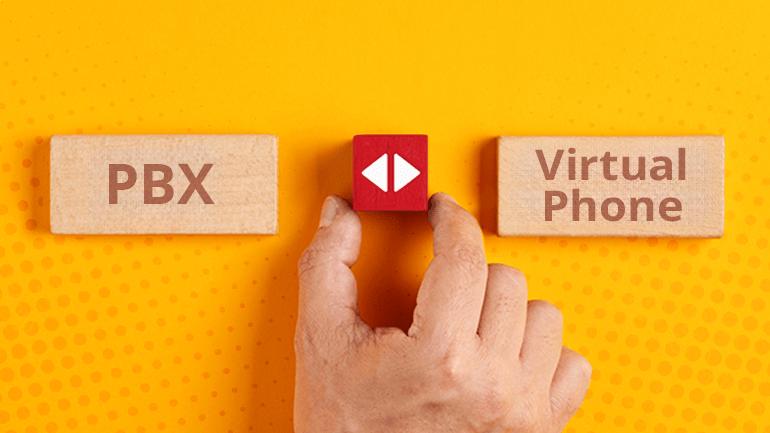The introduction of the virtual phone system has resulted in a massive leap forward for business communications. For many years, the hardware telephony system, primarily the on-premise Private Branch Exchange (PBX), was the gold standard for handling phone calls. These systems, while effective in the past, come with the disadvantages of significant hardware costs, complex setups, limited capabilities, and burdensome maintenance requirements.
The combination of VoIP and the virtual phone system has taken business communications by storm, and the relevance and practicality of traditional PBX hardware has come under intense scrutiny. This inflexible system is reliant on unwieldy physical infrastructure and is rapidly being replaced by agile, cloud-based solutions that offer cost savings, flexibility, scalability and increased productivity.
In this article, we will explore the major advantages of virtual phone systems over legacy platforms. This comparison will clearly illustrate why so many businesses are ditching their hardware, moving to cloud phone systems, and transforming the way that they communicate.
Traditional PBX vs. Virtual Phone System
A PBX system essentially acts as a private telephone network, enabling businesses and organizations to manage their internal and external calls. One of the main strengths of this type of system is that it allows businesses to share a limited number of phone lines amongst many employees, reducing the need for individual phone lines for each user.
Traditional phone systems are typically dependent on costly and complex on-premise hardware that acts as a central hub for managing calls. Extensive cabling infrastructure is required, with wired phone lines connecting the PBX to the public telephone network and desk phones being connected via telephone lines within the office. In addition, dedicated IT staff are often required to manage the infrastructure and configure the PBX system. Although these systems are generally reliable, they require significant capital and ongoing operational expenditures, while only offering limited functionality and having restricted scalability.
The introduction of internet-based communications, together with cloud computing, has resulted in a significant advancement in telephony – the business VoIP phone system. With this technological leap, phone lines are no longer required, and on-site hardware is now a burden of the past. Instead, virtual phone systems use software and cloud servers to manage calls and other communication services, and advanced features such as video conferencing, call recording, and voicemail-to-email are readily available. In addition, these modern phone systems are designed with mobile users in mind, allowing businesses to seamlessly integrate smartphones, tablets, and other devices into their communication networks.
Essentially, the virtual phone system delivers a highly efficient, flexible, cost-effective and scalable communications service that can be tailored to meet the specific needs of any enterprise or organization.
Advantages of Virtual Phone Systems over a Traditional PBX
It is important to understand why so many businesses are ditching hardware-based phone systems and switching to cloud communications technology. This rapid transformation is due to the clear and undeniable advantages that cloud phone solutions have over the traditional PBX, which include the following:
Significant cost savings
Cost efficiencies are always a major consideration for any enterprise. One of the most compelling reasons that businesses switch to virtual phone systems is the potential for notable cost savings. Traditional PBX systems require considerable investment, including the purchase of server hardware and software, phones, and wiring. Regular, costly maintenance of infrastructure is required, and outdated equipment must be replaced.
In contrast, virtual phone systems do not require significant hardware, software or infrastructure investments. Businesses only need an internet connection and compatible devices, and there is involvement of specialized personnel to manage the system. The actual virtual phone services are delivered by cloud service providers, who typically offer competitively priced, all-inclusive subscriptions that cover maintenance, updates, and support.
Access to advanced features and integration
The introduction of virtual phone services has made most businesses realize that it is no longer acceptable to have a communication system that just handles calls. Today, telephony means so much more than mere voice connectivity, and the features offered by cloud services enhance productivity, improve customer service, and streamline internal communications, giving businesses a competitive edge.
Over-and-above the familiar features of a traditional PBX, virtual phone systems offer a wide array of advanced options that are either unavailable or cost-prohibitive when using legacy hardware. These services include sophisticated call routing and interactive voice response (IVR) systems, video conferencing, call analytics and voicemail transcription. In addition, virtual phone systems can easily integrate with other business tools and software platforms such as CRM applications, making them a powerful asset for any enterprise.
Empowering mobility and remote work
The workplace of today is no longer confined to traditional office spaces. VoIP, Wi-Fi and cellular data have drastically changed the reality of businesses communications. Virtual phone systems make the most of these new technologies to efficiently provide the mobility services demanded by the modern enterprise. Such revolutionary remote work capabilities are in contrast with the limitations of traditional PBX systems that tied users to physical office locations, making this solution ill-suited for businesses with a distributed or remote workforce.
With virtual phone services, employees can access the business phone system from anywhere with an internet connection. Calls can be made from smartphones, laptops, or tablets, ensuring that team members remain accessible no matter where they are. In addition, virtual phone systems often come with mobile apps that allow employees to manage calls, voicemail, and other communication features directly from their personal devices. This flexibility enhances productivity and ensures that employees remain connected to customers and colleagues, even outside the office.
Superior scalability and flexibility
Scaling a traditional PBX system can be time-consuming, challenging and expensive. If a business grows, additional phone lines must be installed, hardware and infrastructure must be upgraded, and complex configurations are required. Similarly, downsizing can leave companies with excess equipment and unused phone lines, which are difficult to remove without incurring additional costs.
Virtual phone systems, by contrast, are highly scalable and flexible, and this is particularly beneficial for businesses with fluctuating needs. Since these systems are cloud-based, users, lines, extensions, and services can be easily added or removed as needed, without having to make any physical equipment or infrastructure modifications. Configuration changes are generally made through a simple software interface or by adjusting a subscription plan.
Exceptional reliability, enhanced disaster recovery, and business continuity
Legacy phone systems are generally reliable, but they are vulnerable to physical disruptions, such as power outages, natural disasters, infrastructure damage, and equipment failures. Any such incident could leave businesses without phone service for extended periods. leading to lost revenue and productivity.
By comparison, the cloud-based architecture of virtual phone systems offers robust reliability and disaster recovery capabilities, resulting in a very high level of business continuity. This is because virtual phone systems are not tied to any single physical location or piece of hardware, and are therefore not vulnerable to local outrages or disasters. Even if an office experiences a power outage, employees can continue to make and receive calls from other locations or devices with internet access. In addition, many virtual phone system providers have redundancy and failover systems in place. This ensures that communications remain uninterrupted, even during unexpected events.
Easy setup, minimal IT requirements
Managing a traditional PBX system is complex and requires ongoing maintenance and support. IT staff with specialized knowledge must configure the system, troubleshoot technical issues, handle hardware upgrades, and ensure that the system is functioning correctly. This is a time-consuming and costly process, especially for smaller businesses without dedicated IT teams.
Virtual phone systems eliminate many of these headaches. Cloud platforms are designed with user-friendly management portals for the subscriber and require minimal technical knowledge to set up and manage. In this case, businesses do not have to employ specialized IT staff to support their communications system. All technical issues such as maintenance and updates are managed remotely by the cloud service provider, leaving the enterprise free to focus on relevant business initiatives.
Meaningful reduction in environmental impact
Sustainability is a key consideration for many businesses as they seek to reduce their environmental footprint. The use of a virtual phone system can significantly reduce a business’s environmental impact in several ways. Traditional phone systems require substantial physical hardware, and these systems must eventually be replaced, contributing to electronic waste. Virtual phone systems do not need the same level of hardware, and use infrastructure that is shared amongst many subscribers. This arrangement is far more efficient than each company having to maintain a separate physical system for their sole use. In addition, cloud-based phone systems are generally hosted in large data centers that are optimized for energy efficiency, thereby minimizing the overall carbon footprint.
One of the primary advantages of virtual phone systems is their ability to support remote and hybrid work environments. This means that fewer employees need to travel to a physical office, lowering the overall carbon emissions associated with daily commuting. Also, cloud-based collaboration tools allow employees and clients to meet remotely, reducing the environmental impact of business travel.
Conclusion
It is imperative that every business should benefit from communication services that allow them to stay competitive in an increasingly connected world. The advent of the virtual phone system represents a fundamental shift in the evolution of connectivity. The adoption of this technology is a forward-thinking choice in the drive to satisfy the ever-changing demands of the modern workplace.
A virtual phone system offers many clear advantages over traditional PBX, including lower costs, enhanced mobility, ease of scalability, and access to advanced features. And we are only at the beginning of this transformation. With advances in artificial intelligence and natural language processing, virtual phone platforms will continue to deliver new and innovative ways to enhance customer interactions and streamline business processes.
As the business world continues to evolve, more companies will embrace the technology that enables this pivotal digital transformation. By necessity, this implies that expensive and inflexible legacy telephony hardware will be ditched and replaced by a flexible, scalable and forward-looking solution – the virtual phone system.







